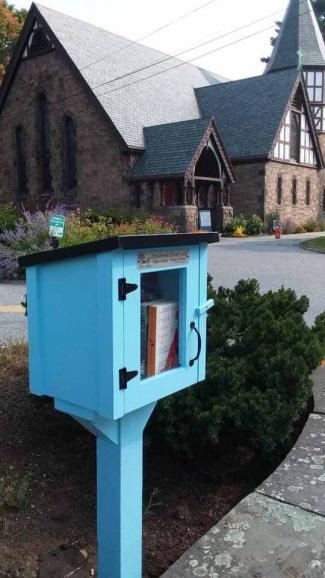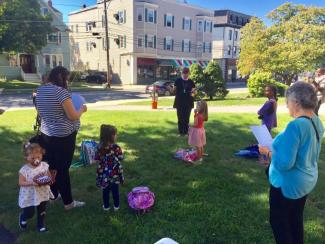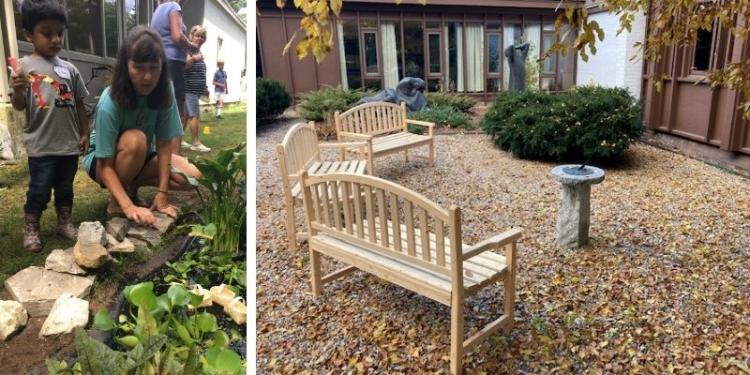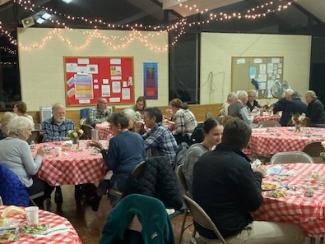Two Diocese of Massachusetts congregations recently participated in The Episcopal Church’s “Genesis II: Re-Vision and Renew”--a ministry redevelopment initiative strengthening parishes for what can be the challenging, yet exciting, work of launching new ministries in their neighborhoods.
“We have a particular focus on the practice of building relationships with fellow parishioners and with our wider community, the Genesis II webpage reads. “We believe that through these relationships we will discover the ways God is active in and around our congregations.”
Through coordination by the Rev. Canon Martha Hubbard, the regional canon for the Northern and Western Region of the diocese, Trinity Parish in Melrose and Trinity Church in Topsfield found their way into the program with “Coaching Cohorts for Redevelopment” in which small teams from each congregation came together on Zoom for 90-minute sessions under the leadership of a coach trained in group coaching and experienced in church leadership.
“It is a way of moving from our former paradigm of waiting for people to come through the doors of the church on Sunday morning to join us, to a paradigm of moving from our worship out into the world to join God and our neighbors in ministry that benefits everyone,” Hubbard said in an e-mail.
Miles Hapgood and Kathleen Gapp, leaders from Trinity Church, Melrose, spoke in a recent conversation over Zoom about how this process has been for them and what it’s all about. One of the first activities assigned to them was reading the book Having Nothing, Possessing Everything by Michael Mather, about the need to look out into the community for gifts that are available.
“It turned my head around to really see what we were doing,” Hapgood said. “Redevelopment is going to come from looking outward and seeing what’s out there that we can tap into, rather than trying to lure people into the church with programs and whatnot that we’ve designed. That was a big takeaway for me: How do we partner with people in the community?”
As prompted by the program, these leaders completed assignments such as calling someone in the congregation out of the blue to hear their story, meeting five new people in a week, inviting three people to do something and then accepting three invitations.
“[The program] was definitely getting more comfortable with meeting people, inviting people, being more outwardly welcoming and hopefully building collaborations--but it was also, certainly, learning a new mindset,“ Gapp explained. “For us, [the activities assigned through the program] did not come naturally; they were somewhat awkward.”
A main part of the program is developing what Genesis II calls 90 day micro-strategies. These are aimed to be a way of thinking about ministry that considers how the current assets of the church can be offered so that new ways of connecting and meeting the needs of the larger community can arise. One of the projects that resulted for Trinity, Melrose was putting up a “Little Free Library” on the grounds of the church for community use.
“Our goal was to put up one of those little libraries to sort of attract people to the parish, and while they’re looking at books, there’s a bookmark about Trinity and a pamphlet about Trinity--not come and pledge, but here’s who we are,” Hapgood said.
On Sunday, Sept. 19, the congregation also hosted a blessing of the backpacks that was open to the whole community, not just members of the parish.
“I think we’ve certainly gained at least the willingness to be more outward-looking,” Gapp said. “We are interacting with our community more and we would like this to continue and expand if at all possible. We’re hoping that we’re still us, just more and better.”
The Rev. Rebecca Blair and lay leader John Wilson of Trinity Church in Topsfield explained, during a separate conversation, how they came to realize through the program that the grounds of their church was their biggest asset, and brainstormed ways to enhance them. In addition to adding cedar benches to encourage people walking by to sit and visit, they decided to build a small pond, complete with frogs, which they used as part of the church's vacation Bible school activities over the summer, drawing in about 20 kids--half of whom were not associated with the parish at all.
“It turns out that lots and lots and lots of people are on our grounds for different reasons, so this is really where we can do evangelism, it’s right here on our grounds,” Blair said. “That was an insight from this process that was really very helpful, because it’s scary for Episcopalians to leave their property to try to talk to people about our church, but the reality is, people come to our property.”
Like Trinity Parish in Melrose, Trinity in Topsfield wanted to increase opportunities for interaction with its community outside of the congregation, so rather than doing its usual "hot dog Sunday" at church over the summer, they instead hosted the event outdoors with music and opened it up for anybody in the community to come for a free hot dog. They also successfully hosted a Community Harvest Italian Dinner on Saturday, Nov. 6.
“It’s our church and you want to share it, and we say we’re welcoming so this was a way of trying to shine the light, not put it under a bushel--shine the light and share it and help folks come in and join us,” Wilson said. “We want to make sure Trinity is there for whoever needs use of the church.”
It was fascinating to learn how different Trinity, Melrose and Trinity, Topsfield are, Blair said, and yet they faced the same issues, so collaborating on this work was well worth the commitment.
“It was great to be with them, because we all know that the church has a whole bunch of issues that we are all facing, so to work closely with another church in a positive way, whether we’re doing problem-solving or something else, was really quite nice,” Blair said. “It’s a bit of a commitment, but it’s not a huge commitment. I think if more people do it, then there might be other kinds of collaborations, because we all know where we are coming from.”
Canon Martha Hubbard echoed this sentiment and commented on the value of such a program, especially in the extra challenging season of pandemic.
“I would recommend it to all parishes, but particularly to those whose leaders sense it is time for some new tools and ways of thinking--those who are wondering what renewed purpose God has for them in the communities where they are planted,” Hubbard said. “Those who want to create a flow between parish and community that allows us to be more in sync with our neighbors, so that the incredible riches of our faith and tradition can be shared.
“I believe the pandemic has ‘cracked us open’ as Stephanie Spellers so aptly put it [in her new book and as a speaker at recent diocesan events], and Genesis II can provide tools for living into this new chapter of our life as church,” Hubbard said. “The church has had to reinvent itself over and over through the centuries, to be a strong witness of Christ’s love in new places and in changing times. I believe the tools provided by Genesis II are tools of reinvention that any parish can pick up.”
--Bridget K. Wood




